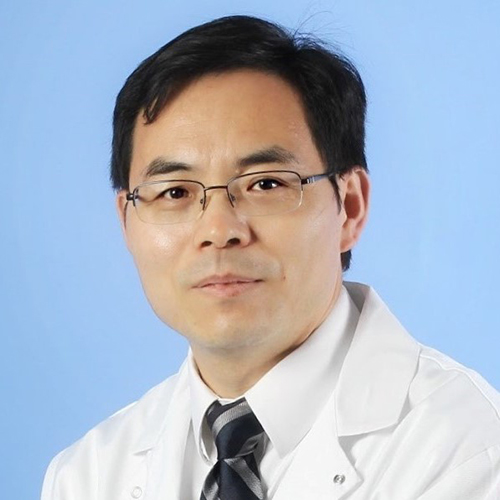![]()
 Lewis Zhichang Shi, M.D., Ph.D.Lewis Zhichang Shi, M.D., Ph.D., associate professor in the Department of Radiation Oncology, is the latest winner of the Heersink School of Medicine’s Featured Discovery. This initiative celebrates important research from Heersink faculty members.
Lewis Zhichang Shi, M.D., Ph.D.Lewis Zhichang Shi, M.D., Ph.D., associate professor in the Department of Radiation Oncology, is the latest winner of the Heersink School of Medicine’s Featured Discovery. This initiative celebrates important research from Heersink faculty members.
Shi’s study, "Selective suppression of melanoma lacking IFN-γ pathway by JAK inhibition depends on T cells and host TNF signaling," was recently published in Nature Communications.
“Concerted efforts from many groups, including us, revealed that melanoma loss of IFN-g signaling is a major reason why most melanoma patients are not responsive to ICBs,” said Shi. “However, strategies of how to overcome this resistance mechanism have been largely elusive.”
In this study, Shi and his team—many of which are from UAB—identified aberrant active JAK1/2 in ICB-resistant melanoma and found that targeting them with FDA-approved Ruxolitinib induced selective suppression of ICB-resistant melanoma, offering a potential targeted therapy for melanoma patients that are resistant to ICBs.
Read more from UAB News about the team’s work.
The Heersink School of Medicine communications staff sat down with Dr. Lewis Shi to gain insights about the research of this study, UAB, and the science community.
Q: What compelled you to pursue this research?
Therapeutic resistance to ICBs is a pressing issue that limits the utility of ICBs in the clinic. Despite our enhanced mechanistic understanding of ICB resistance (e.g., loss of IFN-g signaling in melanoma and colorectal cancer), limited efforts have been given to overcome these resistance mechanisms, which prompted us to conduct this study.
Q: What was your most unexpected finding?
The most unexpected finding in our study is that JAK1/2, two essential kinases in the IFN-g signaling cascade, are actually activated rather than suppressed in melanomas lacking functional IFN-g signaling pathways. Importantly, they appear to be legitimate therapeutic targets to overcome ICB resistance.
Q: How do you feel your research will impact the science community?
To the best of our knowledge, our study represents the very first effort to directly target melanomas with defective IFN-g signaling, a major mechanism of resistance to ICBs. Our team believes in the importance of keeping an open mind when doing research and letting data talk.
Q: What is your research’s relevance to human disease?
Our research offers a potential “targeted” therapy for melanoma patients that are resistant to ICB, particularly those patients with IFN-g signaling-defective melanoma. On a side note, our findings can be extended to other tumor types, given that loss of IFN-g is a shared mechanism of ICB resistance among different tumors.
Q: When did you know you had an important discovery?
When we found that Ruxolitinib selectively suppressed melanomas lacking functional IFN-g signaling but not those with intact IFN-g signaling, in vivo, as this confirmed our systematic in vitro analyses and legitimized active JAK1/2 as therapeutic targets.
Q: How has being at UAB and living in Birmingham affected your research?
Over the past two to three years, we have witnessed the resilience of UAB facing the COVID-19 pandemic. We have undoubtedly benefited from the fact that UAB is an internationally renowned biomedical research institution, with a special focus on nurturing innovative and cutting-edge science. In fact, this study is partially funded by an O’Neal Invests grant from the UAB O’Neal Comprehensive Cancer Center. Also, living in Birmingham gives us the privilege of enjoying southern hospitality embodied by people around us, automatically boosting the morale of my research group.
This study was a collaborative effort across UAB which included experts from interdisciplinary fields of study such as co-senior authors James Bonner, M.D., chair of the Department of Radiation Oncology, and Zechen Chong, Ph.D., assistant professor in the Department of Genetics.
Co-first authors of the study are Hongxing Shen, a postdoctoral scholar in the Shi lab, and Fengyuan Huang, a Ph.D. student in the Chong group.
Other co-authors are Xiangmin Zhang, Wayne State University, Detroit, Michigan; and Oluwagbemiga A. Ojo, Yuebin Li, Hoa Quang Trummell, Joshua C. Anderson, John Fiveash, Markus Bredel, Eddy S. Yang and Christopher D. Willey, Department of Radiation Oncology.
Shi is a scientist, and Bonner a senior scientist, in the O’Neal Comprehensive Cancer Center at UAB.